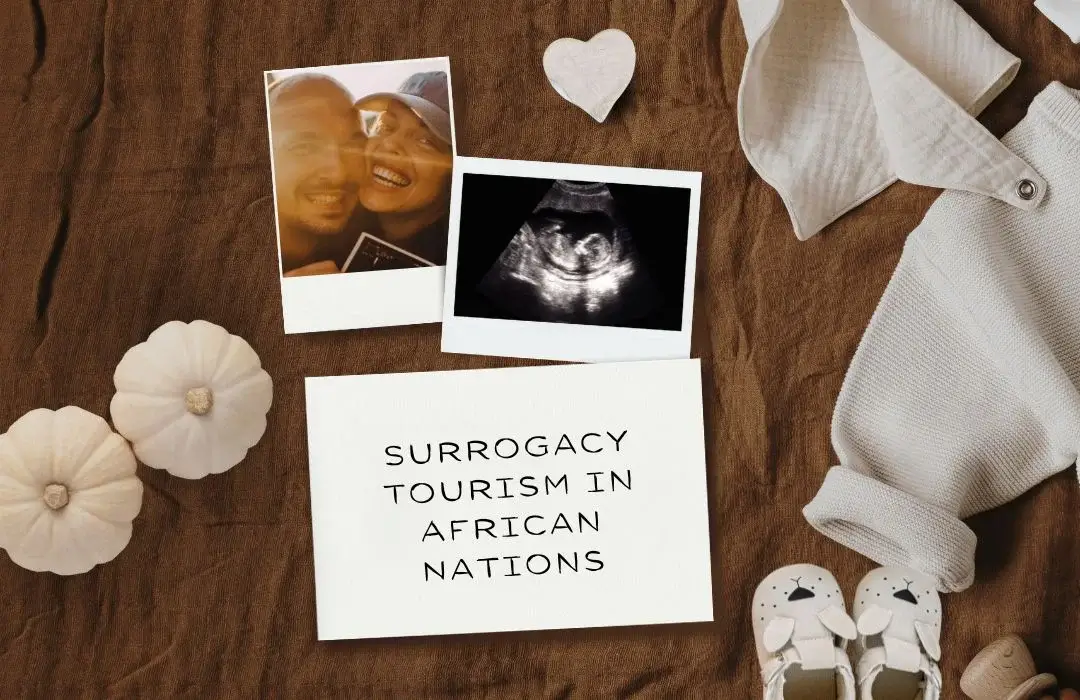With many couples and people looking for reasonably priced and easily available solutions to realise their dreams of being parents, surrogacy tourism has evolved into a Global phenomenon. Although nations like Thailand, and Ukraine have long been surrogacy hotspots, African countries like Kenya have started to attract surrogacy tourism in recent years. In this post, we will discuss why surrogacy tourism is expanding in Africa and what this means for intended parents, surrogates, and local communities.
We will further explore the elements behind this trend, its advantages and drawbacks, and its wider consequences.
What do we understand about Surrogacy Tourism?
In layman’s terms, travelling abroad to arrange for a surrogate to carry and deliver a child is known as surrogacy tourism. Legal restrictions, expensive living expenses, or lack of alternatives in the intended parents’ native country can all be factors driving this. In this regard, Kenya and other African countries are becoming more and more sought-after destinations because of their reasonably priced services, adaptable legal systems, and availability of surrogates.
Why Are African Nations Seeing Increasing Surrogacy Tourism?
Surrogacy tourism has emerged in African nations like Kenya for a number of reasons.
1. Low cost
The cost is one of the main factors couples decide upon Kenya for. While in Kenya the total cost is much less—between $30,000 and $50,000—surrogacy in Western nations can cost upwards of $100,000. This affordability draws intended parents seeking reasonably priced solutions from Europe, the United States, and other countries.

2. Supportive Law
Because Kenya’s surrogacy rules are rather flexible, intended parents have more ease navigating the process. Unlike nations with strict rules, Kenyan family law supports various surrogacy agreements. Particularly for same-sex couples and single parents who might be subject to restrictions elsewhere, this legal flexibility comes of great help
3. Surrogates’ Availability
Another factor driving Kenya’s increasing popularity is the availability of eager surrogates in that country. Many Kenyan women view surrogacy as a chance to make a good living and support the intended parents at the same time. Gradually, this will also help their family’s financial situation to improve. The surrogacy market is driven by this reciprocal benefit: intended parents realizing their dreams and surrogates acquiring financial stability.
4. Medical Advancement
Reproductive technologies and healthcare infrastructure in Kenya have seen notable development in recent years. Modern facilities in fertility clinics are now providing in-vitro fertilization (IVF) and surrogacy treatments, so guaranteeing a safer and more dependable experience for intended parents as well as surrogates.
5. Global Awareness
Success stories and positive testimonies from intended parents who choose surrogacy in Kenya have helped to strengthen its profile as a surrogacy tourism destination.

Key advantages of surrogacy tourism in Kenya
Not only for intended parents but also for local communities and Kenya as a whole, the expanding surrogacy sector offers a list of advantages.
1. Life changing aspect for Surrogates
Many Kenyan women find that serving as a surrogate presents a chance to change their life. Their compensation might enable them to start small businesses, cover tuition, or find better accommodation. Women who have financial freedom empower themselves and help to reduce poverty.
2. Cross-cultural Communication
Surrogacy tourism promotes cross-cultural interactions. From all around the world, intended parents develop bonds with their surrogates based on mutual trust and shared goals. This kind of interaction advances knowledge and helps to remove cultural barriers.
3. Financial Boost
Through job creation and foreign exchange attraction, the surrogacy sector benefits Kenyan economy. The flood of surrogacy clients benefits fertility clinics, legal consultants, and support services, so promoting local economic development.
4. Accessible Parenting
Surrogacy tourism in Kenya offers couples and people overcoming financial or legal obstacles in their native countries a route to parenthood. Those who might otherwise find difficulty starting a family find hope in this accessibility.
Dealing with the Challenges
Although surrogacy tourism has benefits, it also raises serious ethical and pragmatic issues:
1. Treatment of Surrogates
Critics contend that especially in low-income nations, surrogacy tourism can prey on weaker women. Although surrogates are paid, ethical conundrums can arise from the power relations between wealthy intended parents and economically poor surrogates. Making sure surrogates are completely informed and consenting participants is absolutely vital.
2. Lack of Legal Protection
Lack of proper surrogacy laws in Kenya leaves open possibility for uncertainty. Moreover, lack of sufficient legal protections among surrogates, intended parents, even the children born through surrogacy might cause possible conflicts or complications.
3. Cultural Stigma
Surrogacy is still a rather new idea in Kenya, and cultural acceptance differs. The experiences of surrogates and their families could be impacted by some communities seeing surrogacy with mistrust or stigma.
4. Health risks
Medical progress has enhanced safety, but surrogates still run health risks related to pregnancy and delivery. Minimizing these risks requires ensuring access to first-rate prenatal care.

Looking at the Future of Surrogacy Tourism in Kenya
Growing surrogacy tourism calls for addressing issues and creating ethical rules to guarantee a fair and open procedure. Here are some future possible actions:
1. More Regulations in Place
Establishing proper laws to control surrogacy will help to safeguard all the participants. Laws should specify intended parents’ rights and obligations as well as those of surrogates and doctors.
2. Awareness and Education
By increasing knowledge of surrogacy in Kenya, one can help to lower stigma and promote honest communication. Greater acceptance and knowledge of surrogacy as a reasonable alternative can follow from this.
3. Ethical behavior
It is absolutely important to guarantee moral behavior in surrogacy agreements. Agencies and clinics should give surrogates’ well-being top priority and offer them appropriate support including medical and counseling.
4. Global Cooperation
Working together, Kenyan officials and foreign agencies can create best practices and guarantee that surrogacy tourism benefits all those engaged.
Real-world examples of Surrogacy Tourism in Kenya
 1. Jane, a surrogate coming from Nairobi, described how surrogacy let her start a small business and pay for the education of her children. “Although the road is somewhat stressful, knowing I helped a family realize their dream makes it worthwhile,” she said.
1. Jane, a surrogate coming from Nairobi, described how surrogacy let her start a small business and pay for the education of her children. “Although the road is somewhat stressful, knowing I helped a family realize their dream makes it worthwhile,” she said.
2. After running legal obstacles in their own country, Mark and Sarah, a couple from the UK, decided on Kenya for surrogacy. “The procedure went perfectly, and our surrogate was quite remarkable. Kenya handed us the gift of parenthood.
Final words
The emergence of surrogacy Tourism in African countries such as Kenya emphasizes the increasing need for easily available and reasonably priced means of parenthood. The trend also presents ethical and legal issues that need to be resolved even if it offers many advantages.
Kenya has the potential to become a top surrogacy travel destination by encouraging ethical behaviour, enforcing strict laws, and advancing the cross-cultural understanding, so guaranteeing that the process stays fair and advantageous for all those engaged. Though the surrogacy path may appear stressful for both intended parents and surrogates, the results can transform and provide hope, empowerment, and the delight of building families.


No Comments